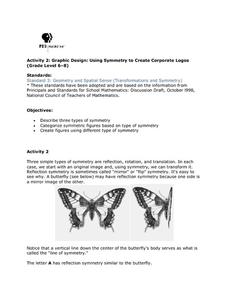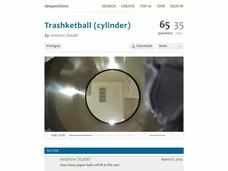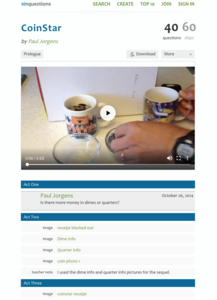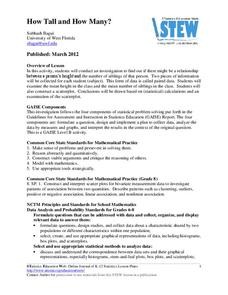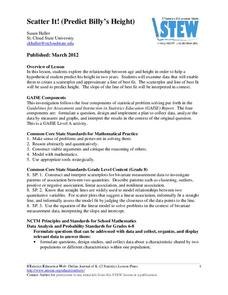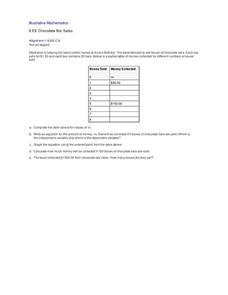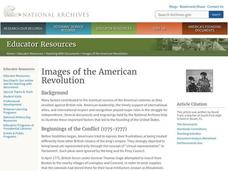Curated OER
Putting the Pieces Together
Children explore fractions on a conceptual level by making individual quilt squares. Each student works with small paper swatches to divide them into pieces that represent a given fraction. The class is then separated into groups and...
Rational Number Project
Initial Fraction Ideas Lesson 18: Overview
Develop young mathematicians' ability to compare fractions with investigation into the number 1/2. After brainstorming a list of fractions equivalent to 1/2, children identify a pattern in the numerators and...
PBS
Using Symmetry to Create Corporate Logos
Young mathematicians investigate the use of symmetry in graphic design. After first learning about reflection, translational, and rotational symmetry, children use this new knowledge to identify symmetry in letters of the...
Noyce Foundation
The Wheel Shop
Teach solving for unknowns through a problem-solving approach. The grouping of five lessons progresses from finding an unknown through simple reasoning to solving simultaneous equations involving three and four variables. Each lesson...
California Education Partners
Animals of Rhomaar
Investigate the growth rates of alien animals. Pupils study fictional animals from another planet to determine how much they grow per year. The investigators plot the growth of their animals over a period of time and then compare...
101 Questions
Trashketball
Take a shot using a lesson on volume! Young learners watch a video showing a trashcan filling with paper balls. The task is to calculate the number of paper balls that will fit in the can. Pupils use volume calculations to make a...
101 Questions
CoinStar
Would you rather have a bowl of dimes or a bowl of quarters? A video introduces the problem by presenting two bowls, one full of quarters and another full of dimes. Learners use information from a CoinStar receipt to calculate the number...
California Education Partners
Theater Field Trip
Here's an assessment task that's better than watching a show. Young mathematicians solve word problems involving multiplication and division with equal groups. They must find the total number of attendees on a trip to a theater based on...
American Statistical Association
How Tall and How Many?
Is there a relationship between height and the number of siblings? Classmates collect data on their heights and numbers of brothers and sisters. They apply statistical methods to determine if such a relationship exists.
American Statistical Association
Scatter It! (Predict Billy’s Height)
How do doctors predict a child's future height? Scholars use one case study to determine the height of a child two years into the future. They graph the given data, determine the line of best fit, and use that to estimate the height in...
Statistics Education Web
It’s Elemental! Sampling from the Periodic Table
How random is random? Demonstrate the different random sampling methods using a hands-on activity. Pupils use various sampling techniques to choose a random sample of elements from the periodic table. They use the different samples to...
Illustrative Mathematics
Chocolate Bar Sales
In this real-world example, algebra learners start to get a sense of how to represent the relationship between two variables in different ways. They start by looking at a partial table of values that define a linear relationship. They...
Illustrative Mathematics
Peaches and Plums
According to the resource graph, which costs more: peaches or plums? Algebra learners compare two proportional relationships and then throw in a banana. Leaving out the scale helps students become intuitive about graphing.
Curated OER
Rolling Twice
Rolling dice is the best way to show your learners how probability comes in to play. Although this instructional activity does not specify an activity, your mathematicians can try this probability with real dice to calculate their...
Curated OER
Quinoa Pasta 2
Learners discover that a system of linear equations models this mixture of quinoa and corn in a collaborative task. Your learners receive all the relevant information in this second of three variants of tasks that ask them to find...
Education Development Center
Integer Combinations—Postage Stamps Problem (MS Version)
Number patterns can seem mysterious. Help your learners unravel these mysteries as they complete an intriguing task. Through examination, collaborative groups determine that they are able to produce all integers above a certain...
Other popular searches
- Everyday Math Number Sense
- Five Senses Math
- Math Number Sense Activities
- Preschool Five Senses Math
- Math Number Sense Review
- Math Number Sense Lessons
- Five Senses Math Lesson
- Number Sense Math
- Basic Math Number Sense
- Grade 6 Math Number Sense


